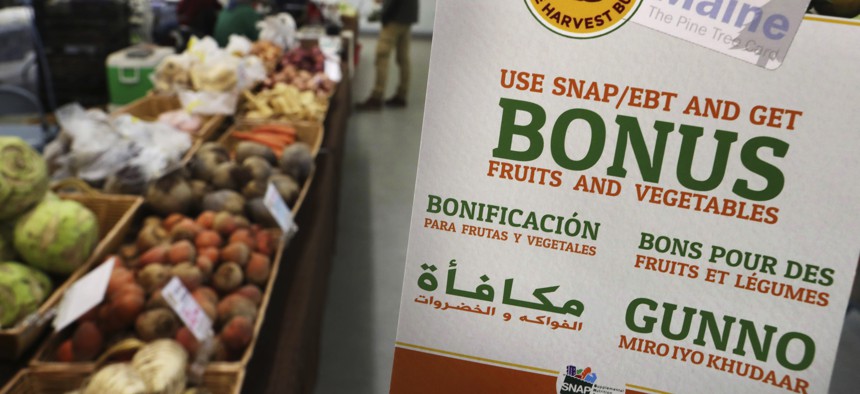‘Public Charge’ Rule Targeting Immigrants Takes Effect

In this Friday, March 17, 2017, file photo, a sign advertises a program that allows food stamp recipients to use their EBT cards to shop at a farmer's market in Topsham, Maine. AP Photo/Robert F. Bukaty

Connecting state and local government leaders
Prospective immigrants seeking green cards will be subject to new scrutiny of their wealth and possible reliance on public benefits under a new immigration rule authored by the Trump administration.
A rule that allows U.S. immigration officials to more strictly scrutinize prospective immigrants’ wealth and reliance on public benefits took effect Monday after a round of legal battles that reached the U.S. Supreme Court.
The Trump administration’s “public charge” rule expands the type of public benefits that could be counted against an immigrant seeking a green card or visa and establishes new income thresholds used to evaluate applicants. An income of less than 125% of the federal poverty level, or $31,375 for a family of four, would be counted negatively against an applicant.
“This rule enforces longstanding law requiring aliens to be self-sufficient, reaffirming the American ideals of hard work, perseverance and determination,” said Ken Cuccinelli, the acting deputy secretary of the Department of Homeland Security. “It also offers clarity and expectations to aliens considering a life in the United States and will help protect our public benefit programs.”
Under the rule, immigration officials will consider an immigrant’s use or potential use of benefits programs—including Medicaid, housing assistance or food stamps—when deciding whether or not to issue a green card. A “public charge” is defined as any noncitizen who receives one or more public benefits for more than 12 months within a three-year period. Officials will weigh these factors along with other considerations like a person’s age, health, financial assets, English proficiency, and education.
Critics of the new rule say it is a wealth test that could dissuade family members of non-citizens from applying for public benefits to which they are entitled. The Urban Institute estimates that one in seven adults in immigrant families reported not participating in a non-cash government benefit program in 2018 for fear of risking future green card status.
The Community Health Care Association of New York State estimates as many as 95,000 Medicaid enrollees could drop their coverage and become uninsured as residents in families with at least one noncitizen may be more likely to disenroll from the federal program.
In California, researchers estimate that the chilling effect on American citizens who live in immigrant families could lead to up to 2.2 million residents to drop Medicaid coverage or stop participation in the food stamp program.
The U.S. Supreme Court in January overturned a nationwide stay that prevented the Trump administration from enforcing the rule. A separate injunction had prevented enforcement of the rule specifically in Illinois, but the high court voted 5-4 in favor of the administration on Friday.
Authoring a dissent in the Illinois case, Justice Sonia Sotomayor criticized the Trump administration’s increasingly seeking emergency stays from the Supreme Court while cases are still working their way through the lower courts.
“Claiming one emergency after another, the Government has recently sought stays in an unprecedented number of cases, demanding immediate attention and consuming limited Court resources in each,” Sotomayor wrote. “And with each successive application, of course, its cries of urgency ring increasingly hollow.”
Andrea Noble is a staff correspondent with Route Fifty.

NEXT STORY: Speaking Statistically, This GOP Donor Wants to Convince You that Money Buys Justice in Texas




